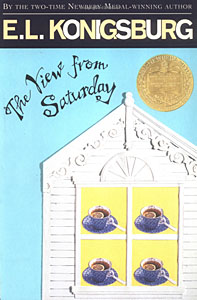One day, on the free book shelf at S&S, I spotted a treasure--The View From Saturday by E.L. Konigsburg. It was a Newbery Medal Winner. It was published by my imprint, Atheneum. And it was by Elaine Konigsburg, the amazing author of From the Mixed-Up Files of Mrs. Basil E. Frankweiler. How could it be that I’d never read it? So I took the book home and the next afternoon I found myself completely absorbed in the novel.
When I started reading The View from Saturday, I didn’t think that I was going to be grappling with issues of diversity or my relationship with diversity in books. I was simply enjoying a sunny afternoon spent on my couch enjoying a great book. It was perfect.
I’d often heard books described as “Mirrors or Windows”--the idea that books can either show you a reflection of your own experience or give you a view into a culture different from your own. Mitali Perkins had spoken quite eloquently about this at the 2010 BEA Children’s Breakfast. But what I hadn’t really ever thought about was that I’d never read a “mirror” book. For me, at least.
Of course there are a number of MG and YA books with Indian protagonists--but I had never seen myself in them. I’d read historical fiction about girls in India but that wasn’t the India I knew (as it is, I’ve only lived two years of my life in India), and I’d read books about Indian-Americans in contemporary America (but I’m not Indian-American). Neither captured my experience.
And then, unexpectedly, I encountered the character of Julian Singh in The View from Saturday. And for the first time, I met a character who mirrored my life in numerous meaningful ways.
Julian was half Sikh (check!), his mother was a chanteuse (Okay, my mum was a career diplomat but is also an EMI recording artist--music has always been a big part of my upbringing), he grew up on cruise ships in between places (I didn’t grow up on cruise ships, but I am a Third Culture Kid), he had an accent that didn’t match his passport (he was American with a British accent, I have an Indian passport but essentially an American accent), and finally, he was happy to make his home in a new place... oh, and he was a tea drinker (check and check again!).
I don’t know that I immediately recognized how meaningful it was that Julian mirrored my own experience. I think initially I was simply happy to see a half-Sikh character in a story where I didn’t expect to, but then I read a few simple, powerful lines in the novel that seemed to make everything fall into place. They were spoken by Julian’s father as he described the journey each of the four main characters had to make in order to find one another--to find community, to find home:
“Julian was last. His journey has been the longest.”
These lines deeply resonated with me. They acknowledged that everyone makes this journey, but for some of us for whom “home” is defined in the “in between” that journey can take a bit longer. As I read that line a jolt went through me, and a path was created between my brain and my heart. I had always been intellectually dedicated to the concept that we need books in which kids can see themselves. But I finally understood this on an emotional level. The experience of reading this novel reaffirmed my sense of pride, conviction, and mission in my work as an editor. But it also reminded me why I am a reader. It seems crazy that it happened a decade into my career as a children’s book editor. But for the first time, I felt understood.

what a wonderful and thoughtful post, namrata.
ReplyDeletethank you for sharing this.
Oh my children loved that book! And they felt a kinship there on an entirely different account.
ReplyDeleteOne of the reasons I've written about military families is that the military tends to function as it's own culture and those kids who live overseas with the military sometimes have that sense of dislocation third culture kids have. Sara Holmes Lewis also writes about military families and has some great resources on her website for them. It's been nice to see a cluster of novels in the last few years that address the experience of military children.
It's wonderful that you found your mirror...
ReplyDeleteIn a way, as an Aussie passport holder with an Indian accent and a US green card, Julian's journey speaks to me as well. I love Mixed-Up Files but didn't know about this book--thanks for the introduction.